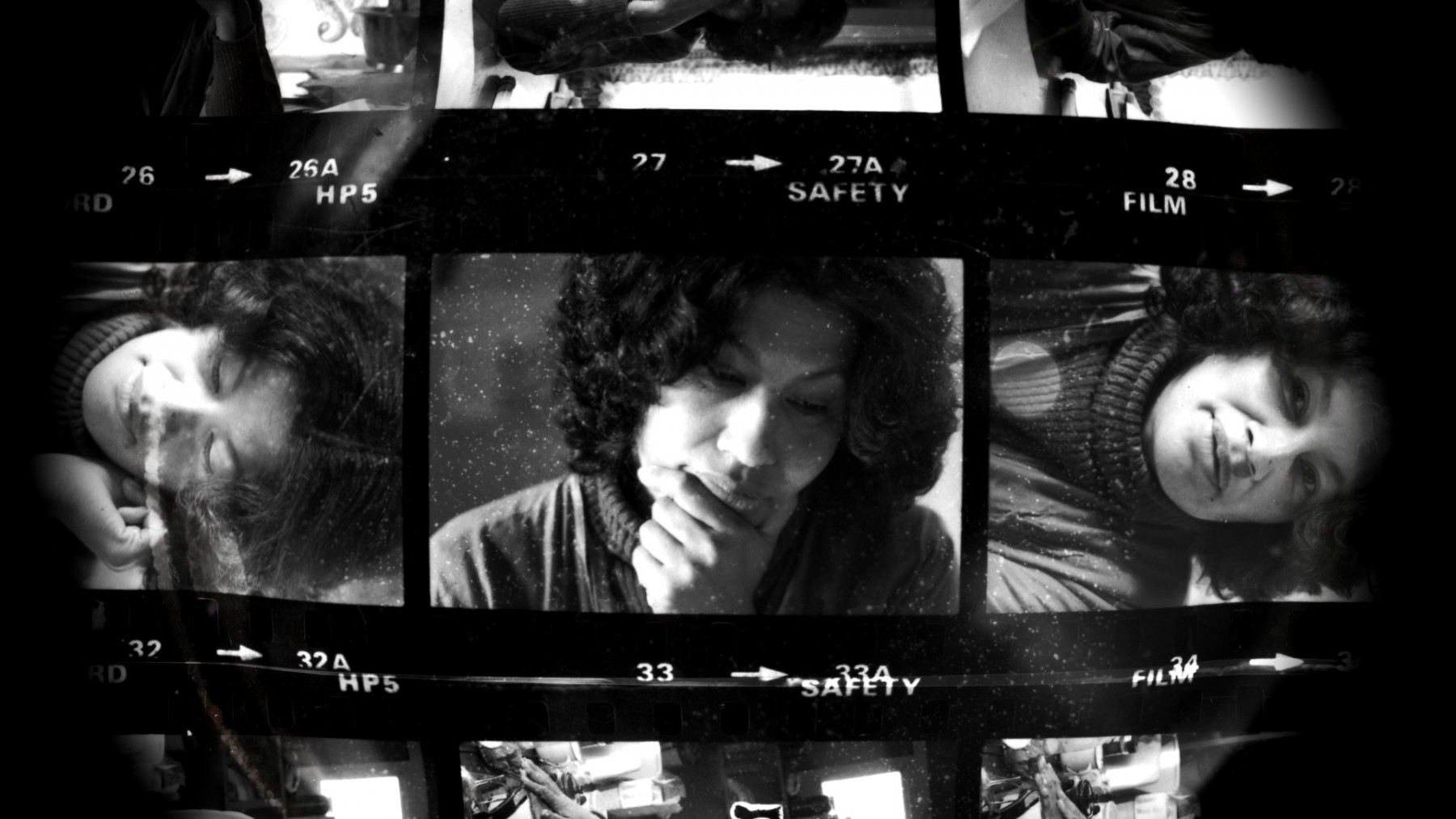Themed Playlist: Mothers of Invention
From Corinn Columpar and So Mayer
In Revolutionary Mothering: Love on the Front Lines, Alexis Pauline Gumbs asks: “What would it mean for us to take the word ‘mother’ . . . as a possible action, a technology of transformation?” This playlist coincides with the publication of our co-edited collection that attempts to answer this question within the context of cinema and media studies: Mothers of Invention: Film, Media, and Caregiving Labor, which is now available from Wayne State University Press (UK readers may wish to order from a UK-based independent bookstore). By examining parenting, as both a theme and a diversified practice, in film and media cultures, Mothers of Invention explores a variety of ways that mothering can function as a form of radical caring labor.
The 16 essays that comprise the collection take up a broad range of texts with global reach, from the work of a number of filmmaking contributors, including Jules Arita Koostachin, Kristy Guevara-Flanagan, and Irene Luzstig; to the television series Top of the Lake (2013-2017) and Jane the Virgin (2014-2019); to, finally, numerous films, such as De mére en fille(Anne Claire Poirier, 1968), Bashu, The Little Stranger (Bahram Beyzai, 1989), La primera sonrisa (Guadalupe Sánchez Sosa, 2014), Prevenge (Alice Lowe, 2016), A Deal with the Universe (Jason Barker, 2018), and Through the Night (Loira Limbal, 2020).
With this playlist we want to expand the purview of the collection even further while also unpacking its organizational logic and conceptual ambitions. As a result, we have programmed four double features, each of which corresponds with, and captures the spirit of, one of the collection’s four sections — “Working Parents,” “Aesthetics of Maternity,” “Forms of Collectivity,” and “Alternate Genealogies” – and we have selected texts that are like the works mentioned above in their capacity to realize the transformative possibilities identified by Gumbs. In so doing they frame motherhood as not only a source of invention, but also a site of continual reinvention fueled by critical, creative, and collaborative acts of care.
***
Cameraperson (Kirsten Johnson, US, 2016)
For Sama (Waad al-Kateab and Edward Watts, Syria/UK, 2019)
Two recent documentaries exemplify the kinds of attentive engagements and affective circuits that are foregrounded in Mothers of Invention, especially its opening section, “Working Parents,” which considers the cascading demands shouldered by working parents, especially mothers: Cameraperson and For Sama. Both of these films explore the possibilities of a parental gaze and both, in a rigorously ethical manner, contextualize this gaze within – while also pushing against – frames of war. The result is an understanding of filmmaking and parenting as mutually implicated and urgent forms of caregiving labor.
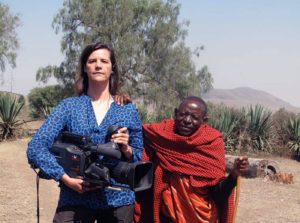
With Cameraperson, Kirsten Johnson produces an archival montage, editing together footage she previously shot in her capacity as a cinematographer for numerous documentaries. As she does so, she foregrounds images of collaboration, improvisation, tenderness, and patience and thereby makes visible communities and acts of care that are integral to the filmmaking process but are typically relegated to offscreen space. Of particular note are the many children (including her own four-year-old twins) to whom Johnson pays close attention and regards with utmost respect, many of whom find themselves in situations of conflict, violence, or precarity.

In For Sama, Waad al-Kateab documents five years of the recent uprising in Aleppo, Syria, a period of time during which she also falls in love, marries, and has a baby. The film is comprised entirely of her citizen journalism in the form of home movies and phone camera diaries, which were uploaded online and/or broadcast by news channels before being edited by al-Kateab and Edward Watts into a feature-length, non-linear narrative film. Witnessing and weaving, the film provides intimate access to visceral scenes of a city under siege in order to preserve, for both her infant daughter and the world at large, that which would otherwise be subject to violent erasure.
Cameraperson is available on Dogwoof (rent/buy) in the UK and Criterion Channel (subscription) in North America.
For Sama is available on All4 in the UK, PBS in North America, and Vimeo on Demand in Australia.
***
Documenteur (Agnès Varda, France/US, 1981)
Pain and Glory (Pedro Almodóvar, Spain/France, 2019)
The second section of Mothers of Invention, “Aesthetics of Maternity,” is devoted to the discussion of works that are highly personal and self-reflexive as they explore the experience of motherhood and/or the relationship between mothers and their children. In keeping with this focus, the second double-feature pairs films by Agnès Varda and Pedro Almodóvar, two filmmakers for whom motherhood is an emotionally resonant theme that recurs across their bodies of work in a spirit of ongoing reflection and refraction, autobiography and metafiction.
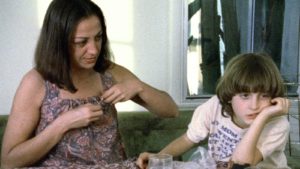
Varda made Documenteur while separated from Jacques Demy and living in LA with her son, Mathieu. Simultaneously document (documentaire) and lie (menteur), the film features Sabine Mamou as the mother to Martin, played by Mathieu, as they attempt to create a new home in a strange land. At the film’s start a voice-over narrator (Delphine Seyrig) distills the world down to faces and words, but throughout the film it is gestures that speak volumes about the intimacy between parent and child. As they embrace, stroll together, play ball, and crawl like crabs, the pain of heartbreak gives way to a multitude of other emotions.

In Pain and Glory, Banderas serves as proxy for Almodóvar in the role of an aging film director whose memories of the past – especially of his mother during his childhood (Penelope Cruz) and, later, at the end of her life (Julieta Serrano) – engulf him. While Varda builds intimacy through gesture, Almodóvar builds it largely through dialogue as mother and son speak to each other frankly about the depths of both their devotion and their disappointment. With a spectacular reveal in the film’s final scene, that intimacy, and the vulnerability it engenders, proves the stuff of inspiration.
Documenteur is available on Criterion Channel (subscription) in North America, dafilms.ca (subscription) in North America, Europe, and Asia, and MUBI (subscription) in the UK.
Pain and Glory is available on Sundance Now/Prime Video (subscription) in the US, CBC Gem (subscription) in Canada, and BBC Four (until 12 May), BFI Player (rental) or Prime Video (subscription) in the UK.
***
Cart (Boo Ji-young, South Korea, 2014)
Better Things (Pamela Adlon, US, 2016-2022)
As interested as Mothers of Invention is in the material realities of individual parents, it is equally invested in the collective possibilities of motherhood, which are realized through the extension of caregiving practices beyond the familial unit. The book’s third section, “Forms of Collectivity,” attends to such possibilities, as do the film Cart and the television series Better Things. In both of these texts, it is affective and effective circuits of friendship, citizenship, and mothering that build community amongst characters and audiences alike.

A rare fiction film about feminist labor organizing, Boo Ji-young’s Cart tells the story of Sun-hee (Yum Jung-ah), a shy and passive contract worker at a supermarket whose sudden dismissal from her job leads her to join in protest and unionization efforts. Like many of her colleagues, Sun-hee is a working-class single mother, and as she becomes more outspoken, she reconnects with her estranged son, Tae-young, who is played by K-pop star Kyungsoo (Exo’s D.O.). While Kyungsoo’s involvement in the film has helped make it a cult hit among K-pop fans, its story about struggle in solidarity is another resonant tie with K-pop fandom, which is often defined by its activism.

At the center of Better Things is Sam, a single mother to three daughters who is played by, and based on, the series’ co-creator, co-writer, and director Pamela Adlon. At its most pensive, the series pronounces that “every mother is a single mother,” but it also insists on a fluid understanding of family and an ethos of collective caregiving that takes Sam’s bustling home as a locus of interactivity. While Adlon considered abandoning Better Things at the end of season two, when her co-creator, Louis C.K., was accused of sexual misconduct, she persisted on her own, building to a recently aired fifth and final season that has roundly been described as a masterpiece.
Cart is available to US viewers on Korea On Demand.
Better Things is available on Hulu (subscription) in the US, Disney+ (subscription) in Canada, and BBC iPlayer in the UK.
***
Merata: How Mum Decolonised the Screen (Hepi Meta, New Zealand, 2018)
Stories We Tell (Sarah Polley, Canada, 2012)
While the first two items on this playlist deploy a parental gaze, the last two enact a reversal of sorts by featuring children – namely, archivist Hepi Mita and filmmaker Sarah Polley — telling stories of their mothers. In so doing, they share ground with “Alternate Genealogies,” the final section of Mothers of Invention, which focuses on work that constructs maternal genealogies by forging connections with both dislocated pasts and feminist futures. Both Mita and Polley undertake their projects without overtaking their mothers’ voices in a spirit of intergenerational exchange and care.
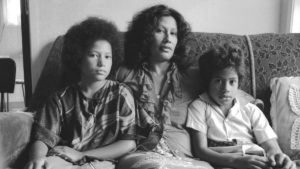
In Merata: How Mum Decolonised the Screen, Hepi Mita retells, and entwines his own story with, the story of the national cinema of Āotearoa/New Zealand, by attending to the work and life of his mother, filmmaker Merata Mita (Ngāti Pikiao and Ngāi Te Rangi). Interweaving footage from Merata’s films, including the world-famous Patu! (1983), with conversations with his older siblings, Hepi traces Merata’s emergence and evolution as a politically engaged Māori filmmaker. As he does so, he refuses to suggest divisions between the roles of filmmaker, activist, and parent; instead, he explores their connections, following the lead of his mother, who once said, “when you have kids, you have an investment in the future, and you come out fighting again.”
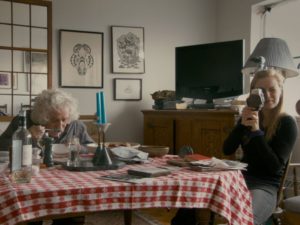
Like Hepi, Sarah Polley comes from a family in the storytelling business –her mother, Diane, and her father, Michael, were involved in theatre and entertainment – and with Stories We Tell she both builds on and interrogates that legacy in order to produce an unsettling story about identity. One the most distinctive elements of the film is its inclusion of material that seems to be home movie footage but is actually a series of staged (re)enactments. With this distinctive cinematic language, Polley is able to begin unravelling the mystery of her mother, who died when Sarah was a child, by filming and even conversing with the actress who plays her (Rebecca Jenkins).
Merata: How Mum Decolonised the Screen is available on Netflix (subscription).
Stories We Tell is available on Kanopy in the US, NFB.ca in Canada, and Curzon Home (rent) in the UK.
—-
Corinn Columpar is associate professor of cinema studies at the University of Toronto. She is the author of Unsettling Sights: The Fourth World on Film (Southern Illinois University Press, 2010) and co-editor, with So Mayer, of There She Goes: Feminist Filmmaking and Beyond (Wayne State University Press, 2009). Additionally, she has published articles in numerous journals, such as Camera Obscura, Quarterly Review of Film and Video, and Women Studies Quarterly, and many anthologies, including Indie Reframed: Women’s Filmmaking and Contemporary American Independent Cinema (Edinburgh University Press, 2016), edited by Linda Badley, Claire Perkins, and Michelle Schreiber, and A Companion to Australian Cinema (Wiley Blackwell, 2019), edited by Felicity Collins, Jane Landman, and Susan Bye.
So Mayer is a writer, film curator, and activist. Their books include The Cinema of Sally Potter: A Politics of Love (Wallflower, 2009), Political Animals: The New Feminist Cinema (I. B. Tauris, 2015), and A Nazi Word for a Nazi Thing (Peninsula, 2020); their BFI Film Classics on Orlando is forthcoming in 2023. So is the co-editor (with Corinn Columpar) of There She Goes: Feminist Filmmaking and Beyond (Wayne State University Press, 2009) and (with Elena Oroz) Lo personal es politico: Feminismo y documental (INAAC, 2011). They are a member of the queer feminist film curation collective Club Des Femmes; a co-founder of Raising Films, a campaign and community for parents and carers in the film and TV industry; a board member of LUX, the artists’ film organization; and a regular contributor to Sight & Sound, Film Quarterly, Literal, BFI DVD, and Criterion.
